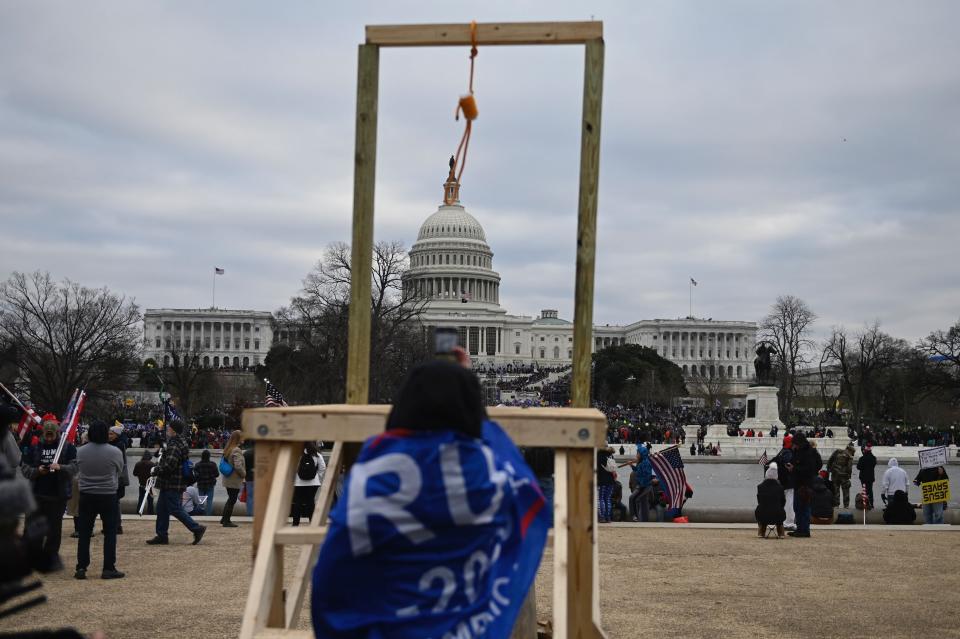Georgia Is How American Democracy Falls Apart
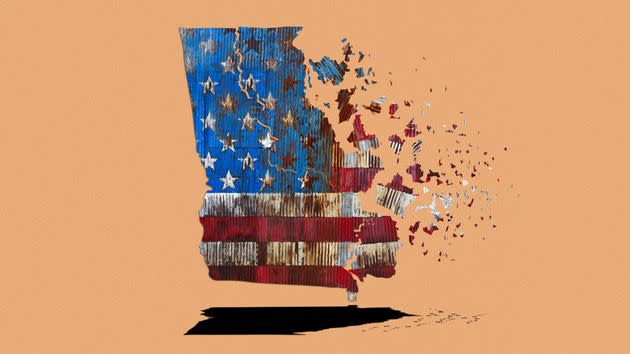
ATLANTA ― David Dreyer just needed a nap. The morning of Jan. 6, Dreyer, a Georgia state representative, had spent most of the last 24 hours in the Georgia World Congress Center watching local officials tally absentee ballots in the two runoff elections that had taken place the day before. The outcome would determine majority control of the U.S. Senate.
Overnight, The Associated Press had projected both Democratic candidates, the Rev. Raphael Warnock and Jon Ossoff, as the winners. But Dreyer was concerned. Since his defeat in Georgia in November, President Donald Trump had sought to overturn the state’s election by falsely claiming that the Atlanta area — the most populous, diverse and Democratic region of Georgia — had been home to widespread ballot fraud. As the election center in Atlanta buzzed with Republican lawyers and conservative poll watchers, Dreyer worried that legitimate votes might get tossed aside. And the margins were razor thin.
Finally, around 11:30 a.m., Dreyer convinced himself that the AP was right: Warnock and Ossoff ― a Black Baptist minister and a 33-year-old Jewish former congressional staffer ― had won Senate races in the heart of the Deep South. He drove home, turned on the TV for a bit of ambient noise and tried to rest for the first time in what felt like months.
“And that’s when the insurrection at the Capitol started,” Dreyer recalled during an interview at an Atlanta co-working space his law firm calls home.
Georgia Democrats, and the coalition of voters who propelled them to a trio of major victories in November and January, have not had time to relax since.
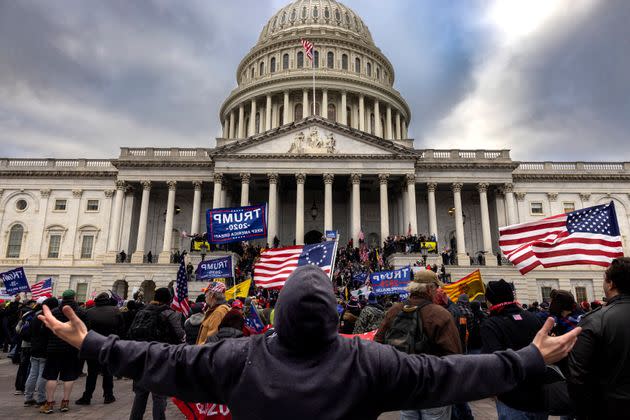
The insurrection at the Capitol was never likely to succeed in preventing President Joe Biden from taking office on Jan. 20, the same day Warnock and Ossoff officially joined the Senate. The true danger to American democracy has emerged in the eight months since the insurrection, as the Republican Party has imbibed the lies that fomented the riots and regurgitated them into legal and legislative form.
Republicans in 19 states have enacted at least 31 new laws to restrict voting rights and overhaul elections. Few have done so as aggressively as the Georgia GOP, which rushed through a sweeping 98-page bill to “reform” the state’s election system almost immediately after the Capitol riot. Georgia Republicans have characterized the law as a vital upgrade that will ensure the security and integrity of its contests; in reality, it is “a breathtaking assertion of partisan power” over the state’s election system.
The law is a two-pronged attack on legitimate elections: It will simultaneously make it harder for many Georgians — especially Black, Latino, Asian and young Georgians — to vote and easier for Republican legislators and their allies to take over election boards and key positions in the counties where those Georgians are likeliest to live.
In August, Republicans began a process that could allow them to appoint a sympathetic ally to oversee next year’s elections in Fulton County, home to Atlanta and the state’s largest concentration of Democratic voters. Last year Trump was recorded begging Georgia’s secretary of state to “find” the votes necessary to overturn Georgia’s presidential count. Dreyer, along with many other Democrats and voting rights activists, worry that the new law might make it easier for Republicans to prevent those votes from being cast in the first place, or for GOP officials to go along with a similar demand in the future.
“They’re laying the groundwork now to nullify elections in the future,” Dreyer said. “I’m concerned that there’s going to be an election that the Republicans are not going to like the results of, and they’re not going to certify that election.”
What’s happening in Georgia now, and what may happen next, illustrates how our democracy could actually fall apart — the same way it has before.
A ‘More Sophisticated’ Jim Crow
Over the last decade, Georgia has shifted both geographically and demographically: Its rural and white populations have shrunk in both real and proportional terms while its major metropolitan areas have grown rapidly and grown more diverse. Georgia has always had a large Black population; it has been joined, in recent times, by an influx of Latino and Asian Americans, who now make up nearly 10% and 4.5% of the state’s population, respectively.
Metro Atlanta as a whole is now majority nonwhite, largely because the areas around the city have changed. Over the last 15 years, for instance, the white, non-Latino population of Cobb County, a northern suburb, has dropped from a tick below 60% to just 51%, while proportionally its Latino and Asian populations have doubled. The Black, Latino and Asian shares of the electorate have all grown over the last two decades: In 2000, 68% of eligible voters in Georgia were white, a share that had dropped to just 58% by 2019.

Demographics are not destiny for Democrats, but Georgia progressives and voting rights groups aggressively sought to organize those communities into a unified political force and then to register them and turn them out to vote in droves. It nearly worked in 2018, when former Georgia state Rep. Stacey Abrams lost the gubernatorial race by just 55,000 votes. In 2020, that coalition of Black, Latino, Asian American and young voters, along with shifts among suburban, college-educated white voters, produced the seismic results those Georgians had been waiting for, especially in the run-offs.
The importance of Biden’s victory in Georgia, the first by a Democrat since Bill Clinton in 1992, is a footnote compared to the historic and symbolic nature of the Senate races. Warnock is the first Black senator in Georgia history and only the fourth ever elected in the South. Ossoff became just the second Jewish senator from the South since 1879.
The organizers who helped produce that shift expected backlash. “I wish that ... we could win and then take our foot off of the gas,” said Nsé Ufot, the CEO of the New Georgia Project, a voting rights group Abrams founded. But historically, she added, “we haven’t had that luxury.”
Still, the speed and scale of the Republican reaction was shocking. Less than 60 days after the insurrection, the GOP state legislative majority produced legislation seeking to overhaul Georgia elections. Gov. Brian Kemp (R) signed it into law on March 25.
The law significantly reduces the options available to voters, along with their access to the ballot. It takes particular aim at the changes implemented to make voting safer during the coronavirus pandemic ― changes that Democrats and voting rights groups used to help drive turnout to historic levels. The law now requires that voters submit proof of ID along with absentee ballots. It no longer allows county officials to mail out ballots unless voters specifically request them, reduces the amount of time voters have to request absentee ballots, effectively bans mobile voting centers, makes it harder for voters to cast provisional ballots if they show up at the wrong polling location and drastically limits the number of drop boxes counties can install to make it easier for voters to return mail-in ballots.
All of these will disproportionately affect Black voters, in particular: Of the 272,000 Georgians potentially affected by the new ID provisions, more than half are Black, according to the Atlanta Journal-Constitution. Black voters will also be targeted by the law’s potentially most drastic assault on the democratic process: the state legislature’s new powers over local election boards, which it is already trying to wield in Atlanta, and that has led to the firings of numerous Black elected officials in other areas with large nonwhite, and overwhelmingly Democratic, populations.
That a multiracial coalition of voters had driven Democratic victories in the South only to be met with attempts to curb their right to vote caused immediate comparisons between the Georgia legislation and racist laws of the past: Activists including Martin Luther King III quickly branded the law “Jim Crow 2.0.”
“Jim Crow was essentially put in place to keep Black people from being able to vote. They’re essentially doing the same thing, just in a more sophisticated way,” King, the son of the late civil rights leader, told HuffPost. “This is a battle for the soul of democracy.”
Georgia has often found itself at the center of the tug of war between America’s loudly proclaimed democratic ideals and its more authoritarian tendencies. Democracy has lost that battle before.
Democracy, For Some
In the summer of 1868, Georgia voters, many of them former slaves who were casting ballots for the first time, elected 33 Black men to the state’s General Assembly. But the joy was short-lived. That fall, the legislature’s white majority expelled the Black lawmakers. Georgia’s Supreme Court ruled the next year that Black men had the right to hold office; in 1870, Congress forced Georgia to reseat the Black legislators. That victory was just as fleeting.
When the Redeemers — white Democrats who sympathized with the Confederacy — retook majorities in December 1870 elections, they forced pro-Reconstruction Republican Gov. Rufus Bullock to flee the state before his term ended. Democrats and the Ku Klux Klan then turned their attention to the Black lawmakers, one-quarter of whom were eventually “killed, threatened, beaten, or jailed,” according to the New Georgia Encyclopedia. The number of Black lawmakers in the Georgia General Assembly dwindled as Democrats implemented poll taxes and other laws to disenfranchise Black voters, along with enacting other measures to segregate every aspect of Georgia society. The last of the Black lawmakers resigned in 1907; the next wouldn’t get elected for another 55 years.
In 1908, Georgia voters approved the addition of a literacy test ― literally a requirement that Georgians prove they were literate in order to vote ― to the state’s constitution. Even if the referendum gave the law the same slight guise of legal legitimacy most other Jim Crow statutes enjoyed, it was hardly democratic. Poll taxes had already systematically removed many Black Georgians — nearly half of the state’s population in 1900 — from the voter rolls. The amendment merely made Georgia one of the last of the former Confederate states to fully eradicate a Black man’s right to vote, and bury democracy in the South along with it.
When we call things like this 'Jim Crow 2.0,' we’re not calling it that because they wrote in 'We don’t want certain people to be able to exercise their votes.' Instead, they craftily use language that allows them to strip voters of their right to vote.Georgia state Rep. Jasmine Clark (D)
Today’s Republicans bristle at the idea that Georgia’s new law and others like it are heirs to the legacy of Jim Crow. “There’s nothing Jim Crow about requiring a photo or state-issued ID to vote by absentee ballot,” Kemp said in March. “Every Georgia voter must already do so when voting in person.”
Kemp and other Republicans have argued that the new law actually expands voting access through its adoption of an extended number of early voting days and its mandate that counties deploy drop boxes for voters to return absentee ballots. And if every Georgia voter must abide by its voting provisions, they cannot possibly be racist in nature, the logic goes.
But few of the Jim Crow laws the Georgia General Assembly enacted from 1870 to 1908 explicitly barred Black Georgians from voting, even if it was clear that that was the intent. Georgia’s poll tax applied to white and Black voters alike; the idea was that poor, Black Georgians would be unable to pay it. The 1908 constitutional amendment made no mention of race: It simply barred Georgians who didn’t own property, who couldn’t read or who didn’t pass an arcane citizenship test from voting. Many white Georgians also couldn’t meet those criteria, so the amendment included a “grandfather clause” ― which granted the franchise to anyone whose grandfather fought in the Civil War ― to give them a route around the barriers meant to exclude Black Georgians from the state’s elections.
“When we call things like this ‘Jim Crow 2.0,’ we’re not calling it that because they wrote in, ‘We don’t want certain people to be able to exercise their votes,’” said Georgia state Rep. Jasmine Clark, an Atlanta Democrat. “Instead, they craftily use language that allows them to strip voters of their right to vote.”
Georgia’s law aims to do just that. Its few expansionary provisions ― requirements that counties add additional weekend days and hours for early voting, for instance ― will apply primarily to rural counties that haven’t typically relied on the practice the way larger, blacker and more Democratic counties have. Fulton County, which is 45% Black and 60% nonwhite, and other counties in metro Atlanta already provided more early voting, especially on weekends, than the new requirement; SB 202, as the new Georgia law is known, does virtually nothing to expand access for their residents.
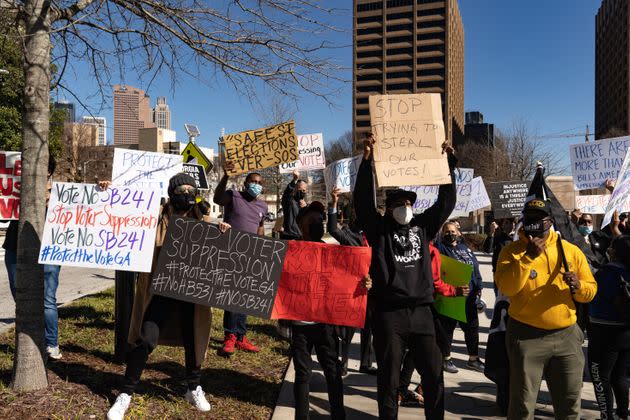
Instead, they’ll bear the brunt of the law’s most restrictive provisions. In 2020, many of Georgia’s largest counties used drop boxes to make it easier for voters to return ballots during the pandemic. Fulton County alone deployed 37, but the new law restricts counties to just one drop box for every 100,000 voters. Fulton County officials will now be allowed to use just nine; a metro Atlanta region that had nearly 100 drop boxes in use last year will have a maximum of 23 available to voters in future contests. The drop boxes that are in use will be restricted to certain locations and accessible only during early voting hours, not 24/7, as they were last year. Fulton County also deployed two mobile voting centers to make it easier for voters to submit ballots last year: More than 11,000 people utilized the option, which SB 202 bans.
“I voted by mail because of the pandemic,” Naween Muwwakkin, a 69-year-old Atlanta resident, said in August as he watched the end of an all-day rally for voting rights that took place near the Rev. Martin Luther King Jr.’s former church. “It made it extremely easy to vote because they sent me all the information. I appreciated that.”
But now, he said, “they’re moving those drop boxes, and it’s going to be more difficult.”
The reasons for Georgia’s turnaround on voting are transparent. Republicans, who created the state’s fairly lenient absentee voting program in 2005, never saw a need to add stricter ID requirements or shorten the window in which voters are allowed to request an absentee ballot (the new law trims it by 102 days) until Democrats used mail-in voting to their advantage last year.
And their other justifications fail to withstand even the slightest scrutiny. There were zero cases of fraud related to absentee ballots in Georgia last year. It’s been more than a decade, in fact, since Georgia has reported a single instance of fraud that identification would address, according to a database kept by the conservative Heritage Foundation, which goes to great lengths to document such cases. That utter lack of fraud is not a result of Georgia’s strict ID requirement for in-person voting. Minnesota, which has no voter ID law, has a fraud rate of just 0.000004% ― two cases of fraud among 45 million ballots cast ― since 1979. The presence of strict voter ID laws, meanwhile, has no demonstrated effect on voters’ perceptions of election legitimacy, studies have shown.
To Muwwakkin, that leaves just one possible motivation for SB 202.
“They saw what we did. Biden won, and Ossoff and Warnock ― the first African American senator,” he said. “They’re mad, so they’re trying to make it harder.”
Those three wins did not cement Georgia’s future as a blue Southern bulwark any more than the victories of 33 Black men ensured the permanent minoritarian status of the state’s white population in 1868. The shifts that produced them merely made Georgia competitive; it’s still unclear how deep or durable they will prove to be. But now, as back then, a major Georgia political faction has surveyed its options in the face of a changing political reality and decided to alter the rules instead of broadening their appeal to more voters or countenancing legitimate democratic defeat.
“In a way it’s a little different than Jim Crow because here it’s purely partisan,” said Columbia University professor Eric Foner, one of the nation’s preeminent scholars of Reconstruction and Jim Crow. “They’re not just going after Black voters ― although they’re going after a lot of Black voters ― they’re going after the Democratic voters.”
“Is it better to disenfranchise people because they’re Democrats, not because they’re Black or Hispanic?” Foner asked, in considering the comparison between the current voting laws and those enacted under Jim Crow. “I don’t suppose it makes much difference. The effort to win the elections by limiting the other side’s ability to vote is fundamentally undemocratic.”
‘This Is The Legal Mechanism To Do What Trump Wanted’
Georgia’s poll tax, adopted in 1877, was extremely successful: In the 1880 presidential election, Georgia was one of just two Southern states in which a majority of Black men did not cast ballots, according to historian J. Morgan Kousser, who attributed its outlier status to the poll tax. Over the next two elections, Black turnout plummeted further, from 38% to just 18%. The 1908 grandfather clause finished the job: 28% of Black Georgians were still registered to vote in 1904, but that number dropped to less than 5% by the end of the decade, Kousser found. (White registration rates climbed from 66% to 73% during the same period.)
Modern means to limit voting access are not designed to have such blatant outcomes, and recent research suggests the new laws may not have huge effects. After a conservative U.S. Supreme Court majority gutted the Voting Rights Act of 1965 in 2013, GOP state legislatures enacted a rash of new voter ID laws and other measures meant to suppress votes from nonwhite communities, but turnout rates among Black voters and other minority groups has continued to rise.
But Georgia Republicans have erected barrier after barrier to voting. In the years following the Supreme Court decision, the state closed more than 200 polling locations, many of them in counties with substantial Black populations. In 2017, it purged more than 100,000 people from voting rolls because they hadn’t cast ballots in recent elections, a change that ensnared some Georgians who intended to vote in that year’s gubernatorial race.
A combination of aggressive efforts to register and mobilize voters and deliberate strategies from some local election officials to make casting ballots easier has helped limit the effectiveness of the GOP’s efforts. But in a state where recent elections have been decided by a few thousands votes among millions cast, even small, almost indecipherable effects on voters’ decisions can loom large, and every unnecessary barrier threatens to erode the democratic legitimacy of the contest.
SB 202, meanwhile, includes provisions meant to ensure that this effort actually works, on the margins and potentially beyond.
In addition to its voting changes, the law also altered the makeup of the state board of elections. It removed Secretary of State Brad Raffensperger — who drew fellow Republicans’ ire for refusing to heed Trump’s call to “find” 11,700 votes to flip Georgia’s presidential results — from his position as chairman of the state board, replacing him with an official appointed by the General Assembly. It also gave the legislature power to trigger reviews of county election boards. If the review determines that county boards have committed serious violations of state election laws, the state board can appoint a temporary superintendent to run the county’s elections.
This is a naked and shameless attempt to control how elections are conducted in the county with the largest concentration of Black voters. And they don’t even give a damn that we know it.Nsé Ufot, CEO, New Georgia Project
The law, in other words, drastically expands the legislative majority’s control over the Georgia board of elections in a way that also gives it more of a say in how certain county election boards are run. If takeovers occur under this provision, a superintendent who’s less accountable to local lawmakers and citizens than the election board he or she replaced, at least for a certain period of time, assume the power to determine the number of polling sites to open and where to put them, to decide various rules for how ballots will be distributed and counted, and even to certify the county’s election results.
“On its face, it’s neutral: It’s like, ‘If you’re not doing what you’re supposed to do, we can have an independent review board come in, and we just want to improve elections,’” said state Sen. Jen Jordan, an Atlanta Democrat who is running for attorney general next year. “But I think what we’ve seen in the last few years, especially after Jan. 6, is that this tool in the wrong hands can be really dangerous.”
“This is kind of the legal mechanism to do what Trump wanted the secretary of state to do, and the governor to do,” she said. “But they couldn’t, because the law didn’t really allow it. This, arguably, is a way to get there.”
Less than six months after SB 202 became law, Republicans confirmed suspicions about where they’d seek to test those new powers: In August, GOP legislators formally requested that the state board of elections launch a review of Fulton County.
Elections in Georgia’s largest county have long been the subject of complaints, and its contests were far from perfect in 2020. The June primary drew national scrutiny because of long lines and apparent mismanagement at the onset of the pandemic. But local lawmakers worked closely with the board to address many of those issues, many of which were merely a result of trying to conduct a huge, complex election in the midst of an unprecedented public health crisis. By November, most of the problems had been ironed out, and Fulton County’s general elections ran relatively smoothly.
The review panel includes one Democratic official, one Republican and Raffensperger’s general counsel; some experts have suggested its makeup could lead to positive changes if the review is conducted fairly.
There are issues to address in Fulton County, but Democrats and voting rights groups are more than a little skeptical that the GOP is actually out to fix real problems that still exist. When 27 members of the state legislature called for the review in early August, they cited the fact that more than 200 Fulton County ballots had been scanned twice during last year’s presidential election. But the problem was caught and addressed during hand and machine recounts, and there’s no evidence, election experts have said, that it was a widespread issue across the state. It was easily addressed with minor changes in how absentee ballots were scanned during the Senate seat runoffs two months later.
The initial request for a review, meanwhile, came from state Sen. Butch Miller (R) in early July, just two weeks after Trump signaled that he wouldn’t support Miller’s primary campaign for lieutenant governor next year, apparently because Miller had been insufficiently zealous in cracking down on “voter fraud and irregularities” last year. Trump has since endorsed Rep. Burt Jones, one of Miller’s primary opponents.
“This is a naked and shameless attempt to control how elections are conducted in the county with the largest concentration of Black voters,” Ufot, the CEO of the New Georgia Project, said. “And they don’t even give a damn that we know it.”
The review process is long and complicated, and it may ultimately prove little more than a partisan ploy. But a GOP in which lawmakers are terrified of their base has fueled a death spiral of extremism within the party since before Trump even entered the picture. That race to the bottom has only intensified since last year’s election. The result is that half of the country and one of its two parties have radicalized against democracy in a manner unprecedented in recent American history.
If the insurrection proved anything, it’s that the worst-case scenario is always on the table. And in Fulton County, that scenario is bleak.
If this gambit works, Republicans could seek to assert a level of control over the county’s elections that they’ve never had before and completely alter the priorities of its contests. A board that doesn’t want to expand voting access could shutter polling locations, especially in predominantly Black parts of Atlanta, or alter rules for distributing, collecting and curing absentee ballots. That could lead to a scale of disenfranchisement that SB 202’s other policies can’t achieve on their own under Fulton County’s current leadership or under a board appointed by local lawmakers.
“They know that if they can take it over, they can start reducing the number of poll locations, start reducing the number of hours, start making it difficult to get an absentee ballot or drop off an absentee ballot,” Dreyer said. “There are a lot of things that have been going on in the Deep South since Reconstruction. They know what to do.”
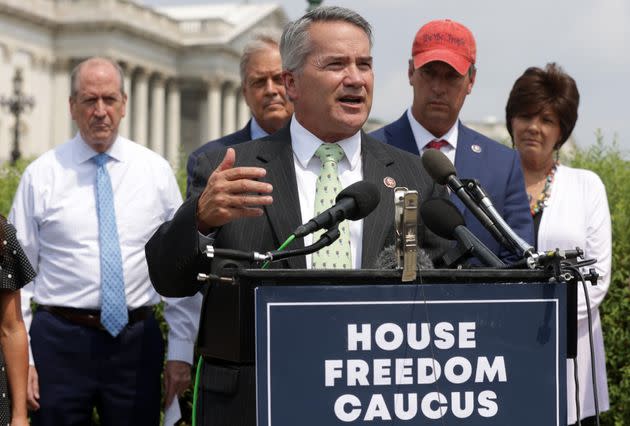
Fulton County is vital to Democratic hopes in Georgia. Biden, Warnock and Ossoff each racked up margins of more than 200,000 votes there, just enough of a cushion to prevail statewide. Republicans don’t need to win it to prevail in statewide contests, they just need to keep it close.
“It’s like death by 1,000 paper cuts,” Jordan said. “These rules around the margins can make a big difference.”
The specifics of SB 202 mean that the GOP can’t place the county under control of a friendly supervisor forever, but Republicans could have a hand-picked ally in charge to oversee next year’s statewide elections. Jordan, meanwhile, worries that if Republicans succeed in Fulton, they will try to replicate the takeover process in Cobb, Gwinnett and other suburban Atlanta counties that have produced the biggest shifts toward Democrats in recent elections.
A presumed rematch between Kemp and Abrams will be the heavyweight battle of 2022, but the secretary of state contest may be just as important. Ahead of the 2024 presidential contest, Republicans don’t just want to keep Abrams out of office; they’d also like to keep hold of the state’s top election office.
The newest Republican candidate in that race, Rep. Jody Hice, is a Trump devotee who called the election challenge that generated the U.S. Capitol insurrection a “1776 moment” and twice voted to overturn the results of the 2020 election.
Hice’s stated reason for challenging Raffensperger, who is seeking reelection even as Republicans continue to villainize him, offers clues as to how he might approach a job running elections, especially if Trump is on the ballot again: In July, Hice told Fox News that Raffensperger’s refusal to accede to Trump’s demands had “compromised” the integrity of Georgia’s elections.
‘Georgia Was The Test’
On Aug. 28, the 58th anniversary of Martin Luther King Jr.’s March on Washington, more than 1,000 Georgians gathered outside the church he once led on Auburn Avenue in Atlanta to protest Republican efforts to restrict voting rights. King founded the Southern Christian Leadership Conference on the same block in 1957, a year in which the Georgia General Assembly approved a resolution that called on Congress to invalidate the 14th and 15th Amendments to the U.S. Constitution, which granted citizenship and “equal protection” to former slaves and the right to vote to Black men. Six years later, King’s march and his “I Have a Dream” speech helped pave the way for the passage of the Civil Rights Act of 1964 and the Voting Rights Act of 1965.
A larger march took place in Washington this year, too, but U.S. Rep. Nikema Williams (D) chose to stay home for Atlanta’s, where crowds were smaller than expected amid the latest surge in COVID-19 infections. Last year, Williams won the Atlanta congressional seat that Democratic Rep. John Lewis, who helped King organize the March on Washington, held for more than 30 years until his death in 2020.
“If you’ve ever wondered what you’d do during the civil rights movement,” Williams said from the stage, “this is the moment to find out.”
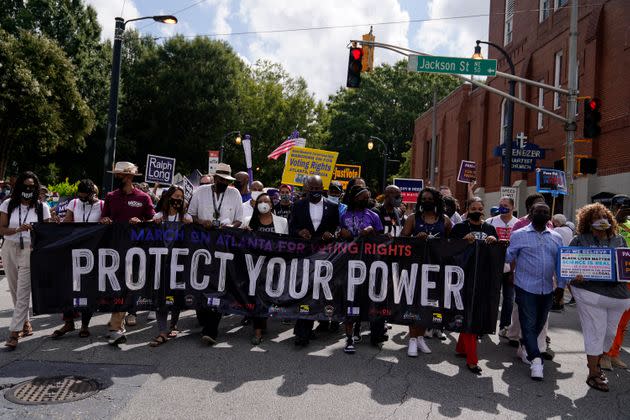
Georgia voting rights activists insist they can prevail even in the face of SB 202.
“We created the conditions that got us the January 2021 outcomes, and we will create the conditions that will protect voting,” Ufot said. “It will be massive, and it will be exhausting, and it will be expensive. But we are capable of doing hard things.”
The New Georgia Project and other organizations have redoubled efforts to register and engage voters, and they see this November, when Georgia will hold thousands of municipal elections across the state, as an opportunity to learn how the law will be used and enforced, and to figure out everything they can about “what needs to get constructed so that we don’t completely lose control of this process,” Ufot said.
But Williams’s plea seemed directed less at the gathered crowd than toward her Democratic counterparts in the U.S. Senate, who are still trying to figure out a path forward on major voting rights and election reform legislation that party leaders say is their priority. Williams and House Democrats have passed two bills, the For the People Act and the John Lewis Voting Rights Advancement Act, but the For the People Act has languished in the Senate, where Sen. Joe Manchin (D-W.Va.) opposes it. Both he and Sen. Kyrsten Sinema (D-Ariz.) have yet to endorse changes to filibuster rules that would allow Democrats to pass any bill with a simple majority.
The John Lewis bill would reauthorize and expand key elements of the Voting Rights Act of 1965, including its requirement that states with a history of racist voting practices clear new laws with the Department of Justice; the Supreme Court’s 2013 gutting of the provision to pre-clear voting rights changes in certain states paved the way for a law like SB 202 to be enacted with ease. On Tuesday, Manchin and other Democrats released a compromise bill to replace the For the People Act that includes most of its voting rights protections and expansions, including mandatory early voting periods and automatic voter registration. The bill would invalidate many of Georgia’s changes, including part of SB 202 that makes it harder for voters to have provisional ballots counted if they show up to vote at the wrong location.
The compromise legislation also seeks to limit partisan gerrymandering, and though it doesn’t go as far as the original bill would have, it could have some meaningful effects on states like Georgia, where 80% of state legislative districts were uncompetitive in 2016.
Gerrymandering had significantly reduced the power of Georgia’s Black and Latino voters even before SB 202 was enacted, thanks to the GOP’s success in carving up its cities and towns into multiple districts. On the whole, gerrymandering reduces the representation of Black voters at nearly every level of government, from state legislatures to Congress, and SB 202 only exacerbates those problems, albeit not through explicit gerrymandering practices: Its changes to voting rules and the GOP’s efforts to take over control of Fulton County will likely shift even more electoral power away from Georgia’s growing cities and suburbs and toward rural, whiter sections of the state. And it will concentrate even more political power in the state legislature, where gerrymandering has ensured that Republicans won’t likely lose majority control any time soon ― even if they soon begin to lose a majority of votes cast in such elections.
Manchin’s bill also adopts proposals from separate legislation Warnock introduced earlier this year to make it harder for state legislatures to purge local election officials and take over election boards, a provision that could thwart efforts like the Fulton County review and other attempts to make it easier to overturn elections.
Senate Democrats and the Biden administration owe passage of that law to Georgia, argue local activists and lawmakers. The state’s voters delivered. None of Biden’s major priorities would be possible without the two senators they elected. Now, they argue, he and Senate Democratic leaders need to put as much energy as they have into major infrastructure legislation into a bill that would bolster the infrastructure of American democracy.
Because just as Democratic and progressive activists saw those wins as a model for future wins across the South, well-funded right-wing groups that are fueling GOP efforts to curb voting rights across the nation have used SB 202 as a model for new laws in other states. Those efforts will only intensify in future state legislative sessions. If Democrats disarm in the fight over voting rights and elections now, they may not have another chance before it’s too late.
“Georgia was the test,” state Rep. William Boddie (D) said during the August march as he stood along Auburn Avenue. “So we have to fight.”
This article originally appeared on HuffPost and has been updated.

 Yahoo Finance
Yahoo Finance 

